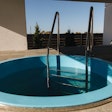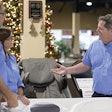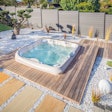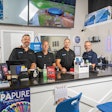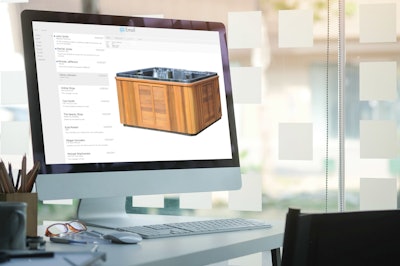
It's not secret that there's been an increased demand for hot tubs. Pool and spa retailers are selling tubs nearly as fast as they can get them, so selling has been easy this year.
However, there is a saying that goes, "Bad habits are developed in good times."
With all of the easy sales coming in, it's tempting to get sloppy with the sales and marketing process. Following up can be tricky when there are so many things happening in the showroom, and product comes in and out of stock.
But booms don't last forever, so now is a great time to develop a strong sales and marketing process that can withstand any market conditions.
One of the overlooked sales tools with the most leverage is email.
THE BENEFITS
This year, more people are calling and visiting showrooms than ever before, so maximizing your salespeople's time and effort is very important. A powerful sales tool is a successful email marketing strategy, which can pre-sell customers before they even walk through the door.
Without a database of prospects to contact on a regular basis, retailers are either relying on ads to do all of their selling or are vulnerable to whatever the market brings them. Fortunately, setting up simple automation to a targeted email list is easy, and while it takes time to create content for automated emails, once the basics are in place, it will work day and night as a remote salesperson without much effort.
This leads to warmed up prospects, who walk in the store and already know about:
1. Carried brands and what makes them stand out
2. Which models they're most interested in
3. What price range they're in for hot tubs and what they can expect to pa.
This article will break down the steps of an effective email marketing strategy to help you make more sales.
DIFFERENT EMAIL STRATEGIES
There are two strategies that most hot tub businesses use when it comes to email. In the most basic version, the prospect finds the dealer's website and asks some questions or replies to some advertising, and the dealer responds to their questions one by one as they come in.
RELATED: 3 Ways to Pull Ahead of Your Competition Online
This method is entirely passive, and while it's a chance to give a personal touch, manually crafting each response is an inefficient way to get people the information they need. It becomes a bottleneck in the business because one person can only answer so many emails in a day, especially when that person has other duties to attend to.
The second most common way of using email uses a template that may have been set up and created by the store, it could have been created by an agency, or the content could have been copied and pasted from the dealer's manufacturers.
These types of emails tend to be product-focused versus consumer- focused. The messaging is often based around, "Look how great these hot tubs are!" — as well as sales and incentive-based emails around event sales and financing deals.
While promotion of this type is a necessary part of every advertising strategy, it's only a small part of a successful marketing campaign that warms up leads to the point that they know, like and trust the dealer. More details on this shortly.
SPEED TO LEAD
The entire pool and hot tub industry is maxed out on time, staffing and energy. So attending to leads, while it is a priority, is sometimes pushed to the back of the list.
Some type of automation will help alleviate the pressure to respond to leads immediately, since an automated system will be working in the background not just to remind them of who the dealer is, but to anticipate their need to get information.
It's not about hounding prospects to buy — it's about giving them helpful information to make an informed decision. And the faster leads get
a response, the more engaged and willing to buy they will be. Some form of email automation guarantees speed to lead is not only instant, but continuous.
Which brings us to our next point: What goes into a successful automated email campaign?
ANTICIPATING NEED
Every hot tub dealer gets the same questions over and over again, especially from first-time buyers. If people can be pre-sold by answering their most common questions — some questions include regionally based ones about climate and other factors, like what the competition has been pushing — and addressing their objections before they get a chance to raise them, they'll be a lot more likely to engage. When dealers anticipate what prospects are already thinking, it adds a lot of credibility in their minds, too.
Try this brainstorming exercise, either as a team or individually, to guide what email content should be about.
– What are 10 questions people are asking about hot tubs on a daily basis? Examples could be, "What kind of base do you need for a hot tub?" or "What does the electrical setup look like in a spa?"
– What are 10 questions people don't know to ask, but they should? For example, the differences between a plug-and-play hot tub and a full- powered 240V hot tub.
– What are 10 assumptions people make about hot tubs that are wrong? For example, busting the myth that salt water tubs are "chemical free."
Add in some questions based around the time of year and holidays and already there are 30 to 50 ideas of emails to write content on, garnered from this exercise, that you can drop into an automated sequence. So even if the dealer isn't in direct conversation with potential buyers, they are still getting insight and their questions answered until they've got enough information to buy.
That's why there truly are no "dead" leads.
WHAT'S NEXT?
If someone doesn't respond right away, that's fine. You don't expect them to.
Picture an email list as a stocked pond: Every time a new lead is captured, another fish is added to the pond. Every time a fish is caught and hooked, a fish is taken out. Every fish is different. Some will take the bait right away, and others will swim around for a while until they either see the right bait — or see the bait enough times to take a nibble.
A hot tub is not an easy or impulsive purchase in most cases. Every once in a while, these folks need some bait to get them to bite.
This could be getting new hot tubs in stock, a special promotion or a unique tub for sale (for example, one that was returned or a scratched tub at a discount).
Another highly effective tactic is "The 9-Word Email," which was made famous by Dean Jackson. The simple version is to ask an easy question at the end of an automated sequence for anyone who hasn't bought yet. There are no sales tactics involved, and it's completely neutral in tone.
It might ask if the person is still in the market for a hot tub. For example, "Hi Theresa, were you still thinking about getting a hot tub?" It seems too good to be true, but this email is guaranteed to get responses.
Most of the time, people haven't bought yet because they haven't had all of their questions answered. Life got in the way or their financial situation wasn't ideal when they first inquired. A simple follow-up email can be both automated and personalized, so it feels like the dealer is reaching out personally.
ADVANCED TIPS
Once people are responding to the automated emails, the responses will usually fall into a few categories: It could be a rejection, a question or an objection. Usually, the same questions and objections come up — that's where templating responses comes in.
Whether dropping common responses into a Google Doc or Gmail's email templates feature, it can take seconds to respond to a lead, as opposed to the minutes it takes to hand type a manual response.
RELATED: Local Digital Marketing: Best Practices for Pool and Spa Companies
Using email templates for responding back to leads can have a threefold effect:
– First, it adds consistency to the buying experience — whether it's an admin staff, salesperson or the owner of a company responding, it's the same every time.
– Second, it saves a lot of time. Carefully handcrafting responses, especially detailed ones, is time- consuming and repetitive.
– Third, because of this saved time, a single person can serve dozens or even hundreds of leads at one time. The sales process becomes far more efficient than having only one-to-one conversations.
All it takes is copying and pasting and some minor customization to fit the situation.
Suddenly, every lead gets a response that seems (to them) well thought out and answers their question directly — which it is!
IN CONCLUSION
The hot tub industry is going to be booming for a while, but whether the industry is in a boom or not, it's a good idea to have strong email marketing in place that does a lot of the heavy lifting for you, so the sales process does not have to rely on human effort (which is often inconsistent).
Staff can leave or a salesperson can have a bad day or need to take time off, but as long as a proven system is in place, the warm leads will continue to pour in, meaning easier — and more — sales for your business.
As the email list grows, it becomes a compounding asset that gets stronger and stronger over time.
Happy fishing!
Ben Poggemiller is the co-owner of Urban Life Pools & Hot Tubs in Steinbach, Manitoba. He also owns a marketing agency, Hungry Fox Marketing, that helps other retailers improve their sales & marketing processes to make sales easier and more profitable. You can learn more at hottubleads.com.
This article first appeared in the September 2021 issue of AQUA Magazine — the top resource for retailers, builders and service pros in the pool and spa industry. Subscriptions to the print magazine are free to all industry professionals. Click here to subscribe.
































